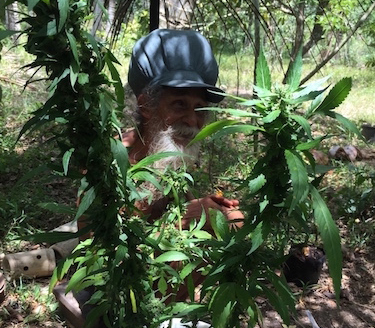
Jamaican Cannabis Landraces: Amanda Feilding on Protecting the Rare, Indigenous Strains
Humanity’s history with cannabis reaches back to the dawn of civilization. Cannabis has long been valued for its long-lasting and strong fibre, its nutritious and oil-rich seeds, as well as its psychoactive and medicinal properties.
Over the last 4000 years, the plant’s valuable, and often unique contribution to the religious, cultural, medical, agricultural, commercial and industrial sectors of human societies ensured that cannabis has been widely cultivated and spread from central Asia to Europe, Africa and the Americas.
In November 2015, as part of the Rastafari Rootzfest, the first Cannabis Cup was held in Jamaica. HIGH TIMES received a total of 65 flower and hash entries from the local growers, separated into 2 categories: “Traditional farming” (outdoor-only methods) and “Modern growing” (indoor growing or outdoor with imported strains, fertilisation and automated irrigation).
To coincide with the Cannabis Cup, the Beckley Foundation hosted a conference with the Ministry of Justice and the Ministry of Industry in Negril which explored and layed out the development of the new regulation for the medical cannabis industry and the sacramental rights of the Rastafari as well as highlighting the need to protect and study landrace strains of cannabis.
Amanda Feilding explains the history and importance of the Jamaican landraces, and the value of ensuring their survival as Jamaica takes steps towards the creation of a regulated cannabis industry. Read her article on the Huffington Post here.
Podcast
- All
Links
- All
Support
- All
BIPRP
- All
Science Talk
- All
Amanda's Talks
- All
- Video Talk
- Featured
- 2016 Onwards
- 2011-2015
- 2010 and Earlier
- Science Talk
- Policy Talk
One-pager
- All
Music
- All
Amanda Feilding
- All
Events
- All
Highlights
- All
Psilocybin for Depression
- All
Current
- All
Category
- All
- Science
- Policy
- Culture
Substance/Method
- All
- Opiates
- Novel Psychoactive Substances
- Meditation
- Trepanation
- LSD
- Psilocybin
- Cannabis/cannabinoids
- Ayahuasca/DMT
- Coca/Cocaine
- MDMA
Collaboration
- All
- Beckley/Brazil Research Programme
- Beckley/Maastricht Research Programme
- Exeter University
- ICEERS
- Beckley/Sant Pau Research Programme
- University College London
- New York University
- Cardiff University
- Madrid Computense University
- Ethnobotanicals Research Programme
- Freiburg University
- Medical Office for Psychiatry and Psychotherapy, Solothurn
- Beckley/Sechenov Institute Research programme
- Hannover Medical School
- Beckley/Imperial Research Programme
- King's College London
- Johns Hopkins University
Clinical Application
- All
- Depression
- Addictions
- Anxiety
- Psychosis
- PTSD
- Cancer
- Cluster Headaches
Policy Focus
- All
- Policy Reports
- Advisory Work
- Seminar Series
- Advocacy/Campaigns
Type of publication
- All
- Original research
- Report
- Review
- Opinion/Correspondence
- Book
- Book chapter
- Conference abstract
- Petition/campaign
Search type
